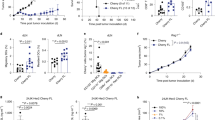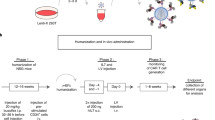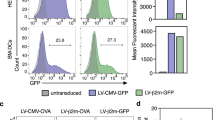Abstract
Dendritic cells (DC) are highly specialized antigen-presenting cells (APC) that initiate and modulate immune responses. They are essential for naive T cell activation, but may also play roles both in central and peripheral tolerance. Blockade of costimulatory pathways that provide the crucial second signal for lymphocyte activation is one strategy to augment the potential tolerogenicity of DC. Here, in vitro propagated DC were transduced using an adenoviral (Ad) vector to express the gene encoding cytotoxic T lymphocyte antigen 4-immunoglobulin (CTLA4Ig), which blocks interaction of CD80 and CD86 on DC with CD28 on T cells. Supernatants of AdCTLA4Ig-transduced DC strikingly inhibited mixed leukocyte reactions (MLR) induced by non-transduced DC. Whereas transduction of marker genes (LacZ or enhanced green fluorescence protein (EGFP)) did not alter their potent allostimulatory activity, DC transduced with CTLA4Ig exhibited striking reductions in cell surface staining for CD86, but not MHC class II, and were poor stimulators of T cell proliferation and cytotoxic T lymphocyte (CTL) responses. In addition, they induced alloantigen-specific T cell hyporesponsiveness. They were detected, following local injection, in significantly increased numbers in the lymphoid tissue of unmodified allogeneic recipients. This is the first report of the functional properties of DC genetically engineered to express CTLA4Ig.
This is a preview of subscription content, access via your institution
Access options
Subscribe to this journal
Receive 12 print issues and online access
$259.00 per year
only $21.58 per issue
Buy this article
- Purchase on Springer Link
- Instant access to full article PDF
Prices may be subject to local taxes which are calculated during checkout









Similar content being viewed by others
References
Steinman RM . The dendritic cell system and its role in immunogenicity Annu Rev Immunol 1991 9: 271–296
Banchereau J, Steinman RM . Dendritic cells and the control of immunity Nature 1998 392: 245–252
Austyn JM . The initiation of immune responses and allograft rejection. In: Rose ML, Yacoub MH (eds) . Immunology of Heart and Lung Transplantation Little Brown: Boston, MA 1993 22–41
Steptoe RJ, Thomson AW . Dendritic cells and tolerance induction Clin Exp Immunol 1996 105: 397–402
Linsley PS, Ledbetter JA . The role of the CD28 receptor during T cell responses to antigen Annu Rev Immunol 1993 11: 191–212
Bluestone JA . New perspectives of CD28-B7-mediated T cell costimulation Immunity 1995 2: 555–559
Thompson CB . Distinct roles for the costimulatory ligands B7–1 and B7–2 in T helper cell differentiation Cell 1995 81: 979–982
Lu L, McCaslin D, Starzl TE, Thomson AW . Mouse bone marrow-derived dendritic cell progenitors (NLDC 145+, MHC class II+, B7–1dim, B7–2−) induce alloantigen-specific hyporesponsiveness in murine T lymphocytes Transplantation 1995 60: 1539–1545
Fu F et al. Costimulatory molecule-deficient dendritic cell progenitors (MHC class II+, B7–1dim, B7–2−) prolong cardiac allograft survival in non-immunosuppressed recipients Transplantation 1996 62: 659–665
Rastellini C et al. GM-CSF stimulated hepatic dendritic cell progenitors prolong pancreatic islet allograft survival Transplantation 1995 60: 1366–1370
Linsley PS et al. CTLA-4 is a second receptor for the B cell activation antigen B7 J Exp Med 1991 174: 561–569
Turka LA et al. T cell activation by the CD28 ligand B7 is required for cardiac allograft rejectionin vivo Proc Natl Acad Sci USA 1992 89: 11102–11105
Lin H et al. Long-term acceptance of major histocompatibility complex mismatched cardiac allografts induced by CTLA4Ig plus donor-specific transfusion J Exp Med 1993 178: 1801–1806
Pearson TC et al. Transplantation tolerance induced by CTLA4Ig Transplantation 1994 57: 1701–1706
Sayegh MH et al. CD28-B7 blockade after alloantigenic challenge in vivo inhibits Th1 cytokines but spares Th2 J Exp Med 1995 181: 1869–1874
Khoury SJ et al. Ex vivo treatment of antigen-presenting cells with CTLA4Ig and peptide prevents experimental allergic encephalomyelitis in the Lewis rat J Immunol 1996 157: 3700–3705
Lu L et al. Growth of donor-derived dendritic cells from the bone marrow of liver allograft recipients in response to granulocyte/macrophage colony-stimulating factor J Exp Med 1995 182: 379–387
Lu L et al. Induction of nitric oxide synthase in mouse dendritic cells by interferon γ, endotoxin and interaction with allogeneic T cells: nitric oxide production is associated with dendritic cell apoptosis J Immunol 1996 157: 3577–3586
Lu L et al. Blockade of the CD40-CD40L pathway potentiates the capacity of donor-derived dendritic cell progenitors to induce long-term cardiac allograft survival Transplantation 1997 64: 1808–1815
Simon JC et al. Ultraviolet B radiation converts Langerhans cells from immunogenic to tolerogenic antigen-presenting cells. Induction of specific clonal anergy in CD4+ T helper cells J Immunol 1991 146: 485–491
Enk AH, Angeloni VL, Udey MC, Katz SI . Inhibition of Langerhans cell antigen-presenting function by IL-10. A role for IL-10 in induction of tolerance J Immunol 1993 151: 2390–2398
Steinbrink K et al. Induction of tolerance by IL-10-treated dendritic cells J Immunol 1997 159: 4772–4780
Lu L et al. Fas ligand (CD95L) and B7 expression on dendritic cells provide counter-regulatory signals for T cell survival and proliferation J Immunol 1997 158: 5676–5684
Thomson AW et al. Microchimerism, dendritic cell progenitors and transplantation tolerance Stem Cells 1995 13: 622–639
Knechtle SJ, Zhai Y, Fechner J . Gene therapy in transplantation Transplant Immunol 1996 4: 257–264
Verma IM, Somia N . Gene therapy – promises, problems and prospects Nature 1997 389: 239–242
Mathisen PM, Tuohy VK . Gene therapy in the treatment of autoimmune disease Immunol Today 1998 19: 103–105
DeMatteo RP et al. Prolongation of adenoviral transgene expression in mouse liver by T lymphocyte subset depletion Gene Therapy 1996 3: 4–12
Knechtle SJ et al. Induction of specific tolerance by intrathymic injection of recipient muscle cells transfected with donor class I major histocompatibility complex Transplantation 1994 57: 990–996
Madsen JC, Superina RA, Wood KJ, Morris PJ . Immunological unresponsiveness induced by recipient cells transfected with donor MHC genes Nature 1988 332: 161–164
Sykes M et al. Specific prolongation of skin graft survival following retroviral transduction of bone marrow with an allogeneic major histocompatibility complex gene Transplantation 1993 55: 197–202
Qin L et al. Retrovirus-mediated transfer of viral IL-10 gene prolongs murine cardiac allograft survival J Immunol 1996 156: 2316–2323
Drazan KE et al. Transduction of hepatic allografts achieves local levels of viral IL-10 which suppress alloreactivityin vitro J Surg Res 1995 59: 219–223
Drazan KE et al. Adenovirus-mediated gene transfer in the transplant setting. Early events after orthotopic transplantation of liver allografts expressing TGF-β1 Transplantation 1996 62: 1080–1084
Olthoff KM et al. Adenovirus-mediated gene transfer into cold-preserved liver allografts: survival pattern and unresponsiveness following transduction with CTLA4Ig Nature Med 1998 4: 194–200
Mathisen PM et al. Treatment of experimental autoimmune encephalomyelitis with genetically modified memory T cells J Exp Med 1997 186: 159–164
Moritani M et al. Prevention of adoptively transferred diabetes in nonobese diabetic mice with IL-10-transduced islet-specific Th1 lymphocytes. A gene therapy model for autoimmunediabetes J Clin Invest 1996 98: 1851–1859
Shaw MK et al. Local delivery of interleukin 4 by retrovirus-transduced T lymphocytes ameliorates experimental autoimmune encephalomyelitis J Exp Med 1997 185: 1711–1714
Otani K et al. Suppression of antigen-induced arthritis in rabbits by ex vivo gene therapy J Immunol 1996 156: 3558–3562
Zhang H et al. Amelioration of collagen-induced arthritis by CD95 (Apo-1/Fas)-ligand gene transfer J Clin Invest 1997 100: 1951–1957
Ghivizzani SC et al. Direct adenovirus-mediated gene transfer of interleukin 1 and tumor necrosis factor α soluble receptors to rabbit knees with experimental arthritis has local and distal anti-arthritic effects Proc Natl Acad Sci USA 1998 95: 4613–4618
de Smedt T et al. Effects of interleukin-10 on dendritic cell maturation and function Eur J Immunol 1997 27: 1229–1235
Buelens C et al. Human dendritic cell responses to lipopolysaccharide and CD40 ligation are differentially regulated by interleukin-10 Eur J Immunol 1997 27: 1848–1852
Yamaguchi Y, Tsumura H, Miwa M, Inaba K . Contrasting effects of TGF-β1 and TNF-α on the development of dendritic cells from progenitors in mouse bone marrow Stem Cells 1997 15: 144–153
Süss G, Shortman K . A subclass of dendritic cells kills CD4 T cells via Fas/Fas-ligand induced apoptosis J Exp Med 1996 183: 1789–1796
Song W et al. Dendritic cells genetically modified with an adenovirus vector encoding the cDNA for a model antigen induce protective and therapeutic antitumor immunity J Exp Med 1997 186: 1247–1256
Henderson RA et al. Human dendritic cells genetically engineered to express high levels of the human epithelial tumor antigen mucin (MUC-1) Cancer Res 1996 56: 3763–3770
Tüting T et al. Autologous human monocyte-derived dendritic cells genetically modified to express melanoma antigens elicit primary cytotoxic T cell responses in vitro: enhancement by cotransfection of genes encoding the Th1-biasing cytokines IL-12 and IFN-α J Immunol 1998 160: 1139–1147
Onodera K et al. CD28-B7 T cell costimulatory blockade by CTLA4Ig in sensitized rat recipients. Induction of transplantation tolerance in association with depressed cell-mediated and humoral immune responses J Immunol 1997 159: 1711–1717
Inaba K et al. Generation of large numbers of dendritic cells from mouse bone marrow cultures supplemented with granulocyte/macrophage colony-stimulating factor J Exp Med 1992 176: 1693–1702
Lu L et al. Propagation of dendritic cell progenitors from normal mouse liver using GM-CSF and their maturational development in the presence of type-1 collagen J Exp Med 1994 179: 1823–1834
Hardy SM et al. Construction of adenovirus vector through Cre-lox recombination J Virol 1997 71: 1842–1849
Thomson AW et al. In vitro propagation and homing of liver-derived dendritic cell progenitors to lymphoid tissues of allogeneic recipients Transplantation 1995 59: 544–551
Author information
Authors and Affiliations
Rights and permissions
About this article
Cite this article
Lu, L., Gambotto, A., Lee, WC. et al. Adenoviral delivery of CTLA4Ig into myeloid dendritic cells promotes their in vitro tolerogenicity and survival in allogeneic recipients. Gene Ther 6, 554–563 (1999). https://doi.org/10.1038/sj.gt.3300862
Received:
Accepted:
Published:
Issue Date:
DOI: https://doi.org/10.1038/sj.gt.3300862
Keywords
This article is cited by
-
Dendritic cells transduced with TIPE-2 recombinant adenovirus induces T cells suppression
Journal of Inflammation (2021)
-
Induction of tumor immunity and cytotoxic t lymphocyte responses using dendritic cells transduced by adenoviral vectors encoding HBsAg: comparison to protein immunization
Journal of Cancer Research and Clinical Oncology (2005)
-
Dendritic cells genetically engineered to express IL-4 exhibit enhanced IL-12p70 production in response to CD40 ligation and accelerate organ allograft rejection
Gene Therapy (2003)
-
Gene- and cell-based therapeutics for type I diabetes mellitus
Gene Therapy (2003)
-
A self-immunomodulating myoblast cell line for erythropoietin delivery
Gene Therapy (2001)



